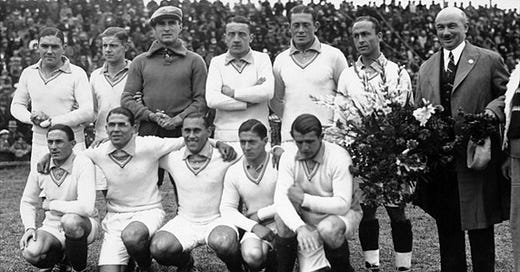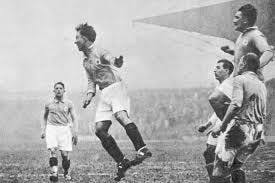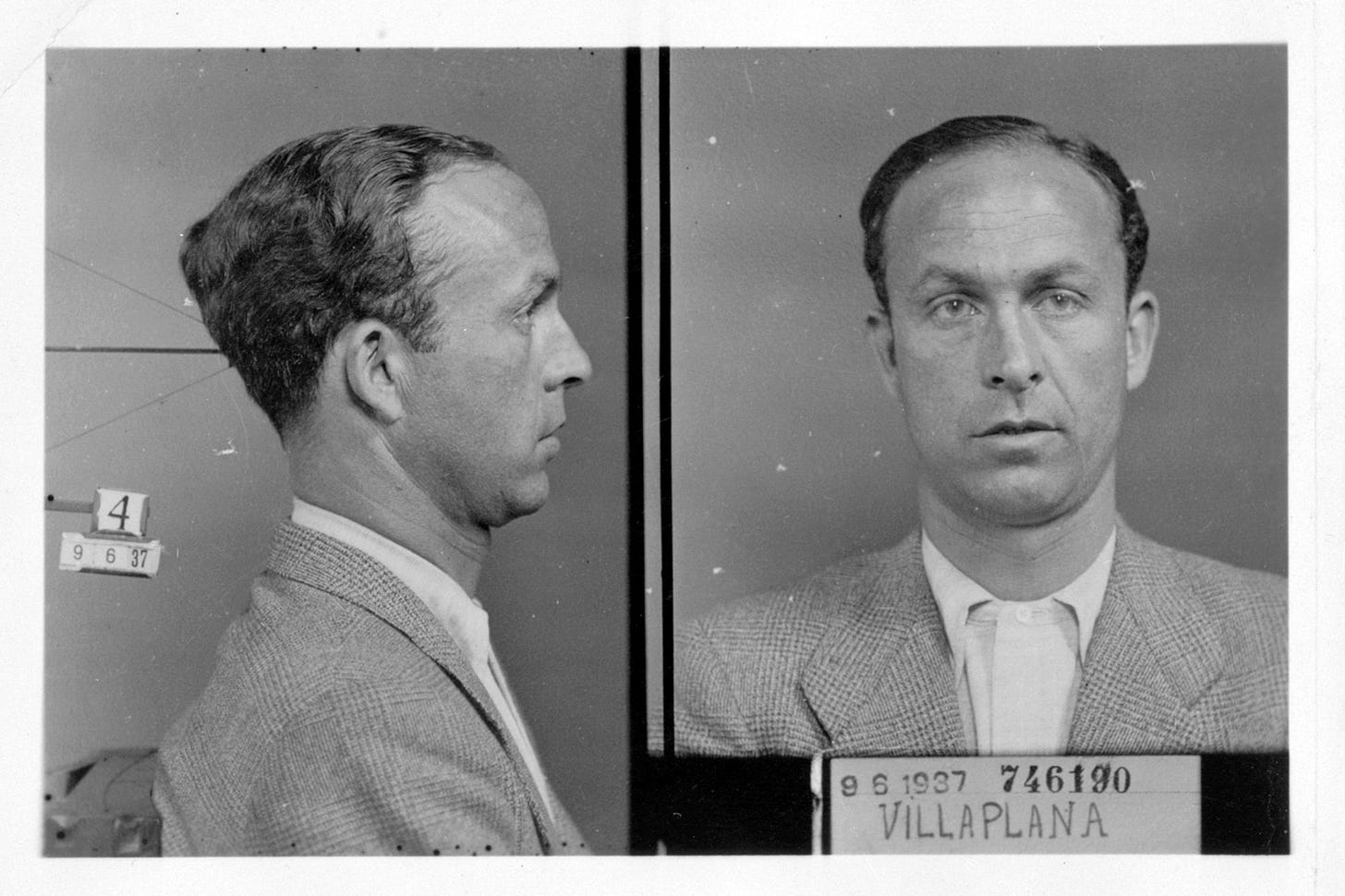Upon Alexandre Villaplane's appointment as the captain of the French national team in 1930, he expressed that it marked the happiest day of his life. At that time, he stood as a celebrated national hero, the most adored sports personality in the country, and had the honor of leading France into the inaugural World Cup in Uruguay in 1930.
However, a mere fourteen years later, his fate took a dark turn. Villaplane met his end by a firing squad, condemned as a traitor and a war criminal. The stark brutality of the Second World War laid bare the true character of this deceitful and treacherous individual.
Hailing from Algiers, which was then part of French Algeria, Villaplane was born into the humble life of working-class immigrants in 1905. His family grappled with financial hardships, and their daily existence was a constant struggle. It is not difficult to speculate whether Villaplane's upbringing contributed to his unquenchable thirst for wealth during his adult years.
Football Beginnings
Villaplane began his footballing career with FC Sete, managed by a Scot called Victor Gibson. Together they helped lead the club to 2 Coupe de France finals in 1923 and 1924, for them unfortunately, they could not overcome Red Star of Paris to secure cup success.
FC Sete proved a springboard for the ambitious Villaplane, a year after making his French international debut in a 4-3 win over Belgium; he signed for Nimes most likely due to the receiving payments. Professionalism only came to French football in 1932.
In 1929 Racing Club Paris, under the presidency of Jean-Bernard Lévy, signed Villaplane aiming to build a side strong enough to overtake their rivals Red Star off their perch at the top of football in France. Villaplane was an automatic choice considering the fact that he was a French international and one of the best players in the country.
A rising sensation, unapologetic about his wealth, found himself in an extraordinary setting in Paris. This setting presented an unparalleled chance, one that appealed to both his ambitions as a footballer and his insatiable desire for personal gain.
He seamlessly combined stellar performances on the football field, which eventually led to his appointment as the national team's captain, with an association with the clandestine world of Paris.
During this phase, his days were dedicated to the football pitch, while his evenings were reserved for indulging in the vibrant nightlife of cabarets and casinos.
World Cup Captain
Arguably being the star of Les Blues, it was unsurprising that at the first ever World Cup held in Uruguay, he was awarded the honor of captaining France at their first ever foray onto the World Stage.
France faced Mexico at the Estadio Pocitos in Montevideo in not only their first ever match, it was also the first ever in the competition's history. Lucien Laurent would score the first ever goal on the way to sealing a 4-1 win.
The two remaining matches for Les Bleus concluded with narrow 1-0 losses to Argentina and Chile. Unfortunately, their World Cup aspirations were abruptly halted during the group stage.
Descent Into Scandal
Villaplane would exit RC Paris to join FC Antibes in 1932, his head turned by a huge cash offer; the beginning of his troubles were just about to start.
Antibes won the League in 1933, in those days the league was split into 2 sections; North & South. Lille from the Northern section were defeated though delight at the triumph didn’t last long. The authorities stripped Antibes of the title and Villaplane, seen as one of the orchestrators of the fix, escaped unscathed.
Despite being in his peak years, the former French Captain’s off the field antics were affecting his football, leading to a rapid decline in his performances. As well as this clubs were less interested in the services of what they perceived as a trouble maker.
In 1933, OGC Nice signed Villaplane, but he had declined as a player. He showed little commitment, arrived late for training, and preferred casinos and horse races. Nice got relegated, and he was sacked.
Gibson, his former coach, later managed Hispano-Bastidienne. Villaplane rarely trained despite Gibson's efforts. His involvement in a race-fixing scandal led to a jail term. More convictions followed until World War II offered new money-making opportunities.
Nazi Gold Digger
The Nazi invasion of France in 1940 was rapid and effective. Commencing on May 10, the Germans swiftly defeated the French army within a month. The French government left Paris on June 10, and four days later, the Nazis seized the city.
Similar to the tactics of colonial powers in the past, the Nazis sought assistance from local residents to solidify their control. One such individual was Henri Lafont, a sinister figure who thrived during the Occupation.
Initially, high-ranking German officials hesitated to collaborate with opportunists like Lafont, fearing it would tarnish the Third Reich's image. However, Lafont demonstrated his value to the Nazis by tracking down and subjecting the leader of the Belgian Resistance to torture, significantly weakening Belgium's resistance against the Nazis.
Lafont and Bonny, former criminals, took charge of the French Gestapo for personal gain during WWII, distancing themselves from Hitler's ideology. Criminals, including those in Marseille, aided the Nazis in capturing Jews for profit.
Villaplane, once a respected figure, joined the Carlingue (French Gestapo) during the Occupation. He quickly advanced due to his cruelty and greed, leading the Brigade Nord Africain to combat the French Resistance. His brutal actions, including summary executions and torture, contrasted with Yugoslavian footballer Ivan Bek, who fought for the Resistance, emphasizing loyalty versus treachery.
One example of Villaplane’s cruelty was evident in a specific incident in Mussidan, southwestern France, where he ordered the summary execution of eleven resistance fighters, aged between 17 and 26, who were then disposed of in a trench.
Justice is served
During the Normandy landings in June 1944, as the Nazi stronghold in northern France faltered, Alexandre Villaplane distanced himself from his overlords. He sought to exploit Parisians, offering to save them for a hefty fee.
However, he displayed a lack of remorse, much like the guards in Auschwitz, revealing himself as a despicable individual. Parisians successfully liberated the city on August 25, 1944.
After the liberation, surviving Carlingue members were captured and faced trial for looting, rape, robbery, and murder. The prosecutor described Villaplane as a cunning manipulator who exploited hope for blackmail.
On Boxing Day 1944, the former football star met his end, executed by a firing squad at the Montrouge fort, his unmarked grave's location unknown. Whether true justice was served remains debatable, as Villaplane was just one of many who revealed their capacity for cruelty in such circumstances.







